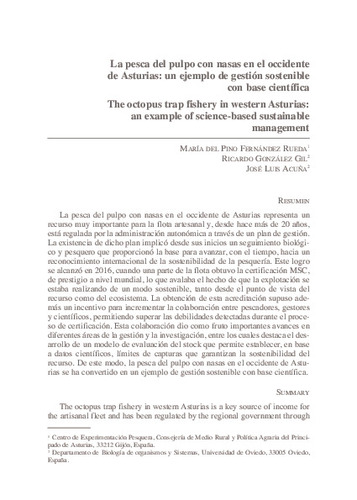La pesca del pulpo con nasas en el occidente de Asturias: un ejemplo de gestión sostenible con base científica
Otros títulos:
The octopus trap fishery in western Asturias: an example of science-based sustainable management
Autor(es) y otros:
Editor/Coord./Trad.:
Palabra(s) clave:
Pesquerías
Pesquerías artesanales
Recursos marinos
Recursos naturales
Pesquería del pulpo
Sostenibilidad pesquerías
Fisheries
Artisanal fisheries
Octopus fisheries
Asturias
Fecha de publicación:
Editorial:
Real Instituto de Estudios Asturianos
Citación:
Descripción física:
Resumen:
La pesca del pulpo con nasas en el occidente de Asturias representa un recurso muy importante para la flota artesanal y, desde hace más de 20 años, está regulada por la administración autonómica a través de un plan de gestión. La existencia de dicho plan implicó desde sus inicios un seguimiento biológico y pesquero que proporcionó la base para avanzar, con el tiempo, hacia un reconocimiento internacional de la sostenibilidad de la pesquería. Este logro se alcanzó en 2016, cuando una parte de la flota obtuvo la certificación MSC, de prestigio a nivel mundial, lo que avalaba el hecho de que la explotación se estaba realizando de un modo sostenible, tanto desde el punto de vista del recurso como del ecosistema. La obtención de esta acreditación supuso además un incentivo para incrementar la colaboración entre pescadores, gestores y científicos, permitiendo superar las debilidades detectadas durante el proceso de certificación. Esta colaboración dio como fruto importantes avances en diferentes áreas de la gestión y la investigación, entre los cuales destaca el desarrollo de un modelo de evaluación del stock que permite establecer, en base a datos científicos, límites de capturas que garantizan la sostenibilidad del recurso. De este modo, la pesca del pulpo con nasas en el occidente de Asturias se ha convertido en un ejemplo de gestión sostenible con base científica. The octopus trap fishery in western Asturias is a key source of income for the artisanal fleet and has been regulated by the regional government through a management plan for over 20 years. The existence of this plan implied, from the beginning, a fishery monitoring that provided the basis for advancing, over time, towards international recognition of its sustainability. This achievement was reached in 2016, when part of the fleet obtained the worldwide prestigious MSC certification, supporting the fact that the exploitation was being carried out sustainably, both from the point of view of the resource and the ecosystem. Obtaining this certification also served as an incentive to increase collaboration among fishers, managers, and scientists, allowing to overcome the weaknesses detected during the certification process. This collaboration resulted in significant advances in different areas of management and research, with particular emphasis on the development of a stock assessment model that enables the establishment of catch limits based on scientific data, ensuring the sustainability of the resource. Thus, the octopus trap fishery in western Asturias has become an example of science-based sustainable management.
La pesca del pulpo con nasas en el occidente de Asturias representa un recurso muy importante para la flota artesanal y, desde hace más de 20 años, está regulada por la administración autonómica a través de un plan de gestión. La existencia de dicho plan implicó desde sus inicios un seguimiento biológico y pesquero que proporcionó la base para avanzar, con el tiempo, hacia un reconocimiento internacional de la sostenibilidad de la pesquería. Este logro se alcanzó en 2016, cuando una parte de la flota obtuvo la certificación MSC, de prestigio a nivel mundial, lo que avalaba el hecho de que la explotación se estaba realizando de un modo sostenible, tanto desde el punto de vista del recurso como del ecosistema. La obtención de esta acreditación supuso además un incentivo para incrementar la colaboración entre pescadores, gestores y científicos, permitiendo superar las debilidades detectadas durante el proceso de certificación. Esta colaboración dio como fruto importantes avances en diferentes áreas de la gestión y la investigación, entre los cuales destaca el desarrollo de un modelo de evaluación del stock que permite establecer, en base a datos científicos, límites de capturas que garantizan la sostenibilidad del recurso. De este modo, la pesca del pulpo con nasas en el occidente de Asturias se ha convertido en un ejemplo de gestión sostenible con base científica. The octopus trap fishery in western Asturias is a key source of income for the artisanal fleet and has been regulated by the regional government through a management plan for over 20 years. The existence of this plan implied, from the beginning, a fishery monitoring that provided the basis for advancing, over time, towards international recognition of its sustainability. This achievement was reached in 2016, when part of the fleet obtained the worldwide prestigious MSC certification, supporting the fact that the exploitation was being carried out sustainably, both from the point of view of the resource and the ecosystem. Obtaining this certification also served as an incentive to increase collaboration among fishers, managers, and scientists, allowing to overcome the weaknesses detected during the certification process. This collaboration resulted in significant advances in different areas of management and research, with particular emphasis on the development of a stock assessment model that enables the establishment of catch limits based on scientific data, ensuring the sustainability of the resource. Thus, the octopus trap fishery in western Asturias has become an example of science-based sustainable management.
Descripción:
La sostenibilidad de las pesquerías artesanales en el principado de Asturias: ciencia, gestión y participación en una agenda regional hacia el 2030. Ciclo de conferencias (2022. Gijón)
ISBN:
Otros identificadores:
Enlace a recurso relacionado:
Patrocinado por:
Agencia Española de Investigación. Este trabajo ha sido financiado por el proyecto ECOSIFOOD (MCI-20-PID2019-108481RB-I00/AEI/10.13039/501100011033). Parte de los estudios citados han sido financiados por el Principado de Asturias y cofinanciados por el FEMP.
Colecciones
Ficheros en el ítem




